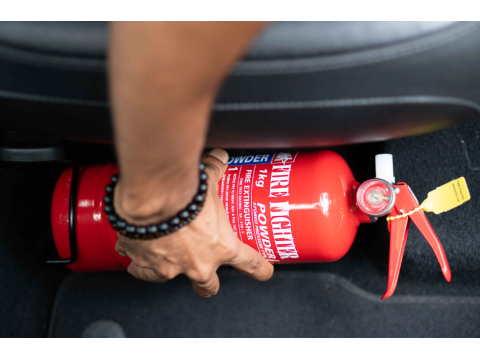Automotive Fire Extinguishers: Types, Uses, and Placement
At safsale.com, we understand the importance of fire safety in vehicles. With electrical wiring, fuel systems, and flammable materials in close proximity, having a reliable fire extinguisher in your car is not just a precaution but a necessity.
Why Your Vehicle Needs a Fire Extinguisher
Modern vehicles are equipped with safety features, but factors like electrical faults, fuel leaks, and overheating components can still lead to fires. A fire extinguisher is your first line of defense against such emergencies.
Types of Automotive Fire Extinguishers
Powder Extinguishers (ОП):
- Ideal for all-purpose use, capable of handling Class A, B, C, and E fires.
- Two types:
- Gas Cartridge (ОПГ): Long-lasting and effective but slightly slower to activate.
- Pressurized Gas (ОПБ): Immediate response, expels powder and displaces oxygen.
CO2 Extinguishers (ОУ):
- Uses carbon dioxide to suffocate fires, leaving no residue.
- Best for protecting premium interiors and sensitive electronics.
- Handle with care to avoid frostbite from the nozzle.
Aerosol Extinguishers:
- Compact and lightweight, ideal for small spaces.
- Releases fine particles or reactive aerosols to interrupt the chemical combustion process.
- Less effective for large fires but convenient for minor incidents.
Key Considerations for Choosing a Vehicle Fire Extinguisher
- Weight: Minimum 4.4 lbs (2 kg) of extinguishing agent for effective fire control.
- Volume: At least 0.5 gallons (2 liters) for standard vehicles.
- Labeling: Check for proper certification, usage instructions, and safety compliance.
Placement and Accessibility
For optimal safety, place the fire extinguisher within easy reach of the driver. Common locations include:
- Under the driver's seat: Quick and unobstructed access.
- In larger vehicles: Securely mount multiple extinguishers in the cabin or near exits.
Common Causes of Vehicle Fires
- Electrical Malfunctions: Faulty wiring, short circuits, or overloaded circuits can ignite surrounding materials.
- Fuel Leaks: Damaged fuel lines or poor maintenance can lead to hazardous spills.
- Overheating Components: Catalytic converters or engines can overheat and ignite nearby materials.
Stay Prepared with Safsale.com
At safsale.com, we provide high-quality fire extinguishers tailored to vehicle safety needs. From compact designs for personal cars to industrial-grade options for larger vehicles, we’ve got you covered.
Browse our selection at safsale.com and equip your vehicle with the right fire extinguisher today.

